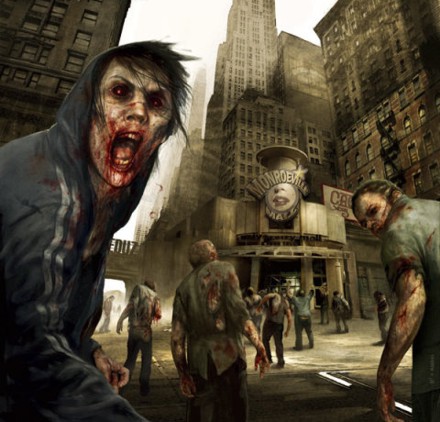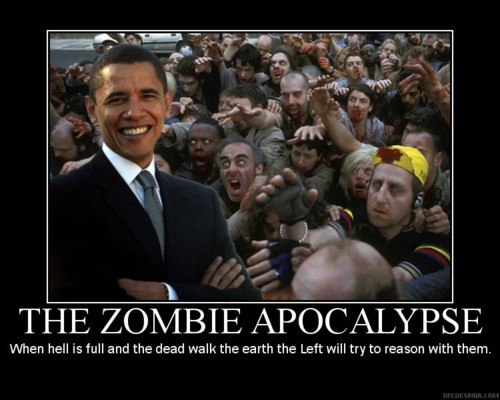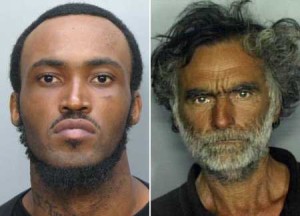Tag Archives: homeless man
Colbert: Zombies Are Intellectual Elites – ‘All They Care About Is Braiiiiiiins’
 College student eating a housemate’s heart? Homeless man eating another homeless man’s face? Porn star sending body parts to government members? “Cannibalism is the hot new trend,” observed Stephen Colbert on last night’s Colbert Report. “And you thought saggy pants were annoying.” The recent spate of these freak incidents in the news has wide swathes of the American public convinced we have a zombie apocalypse on our hands. “It does make one wonder,” Colbert said. “After all, something has clearly eaten [Fox News host] Trace Gallagher’s brain.”
College student eating a housemate’s heart? Homeless man eating another homeless man’s face? Porn star sending body parts to government members? “Cannibalism is the hot new trend,” observed Stephen Colbert on last night’s Colbert Report. “And you thought saggy pants were annoying.” The recent spate of these freak incidents in the news has wide swathes of the American public convinced we have a zombie apocalypse on our hands. “It does make one wonder,” Colbert said. “After all, something has clearly eaten [Fox News host] Trace Gallagher’s brain.”
So it came as a relief when the federal Centers for Disease control on June 1 told the Huffington Post that “CDC does not know of a virus or condition that would reanimate the dead (or one that would present zombie-like symptoms).” Colbert was not buying it, though, especially in light of a (tongue-in-cheek”) CDC “zombie awareness” campaign last year. “It makes sense that zombies would be attracted to science,” he said. “I mean, they’re intellectual elites. All they care about is braaaaaiiiiiinnnnns.”
Miami ‘zombie-like’ attacks continue? Man on ‘Cloud 9′ growls, tries to bite North Miami Beach cop
 NORTH MIAMI BEACH, Fla. (WSVN) — Officers say a man in police custody has an entire department shocked after he allegedly growled and tried to bite an officer’s hand off; an eerie resemblance to the cannibal attack on a South Florida causeway.
NORTH MIAMI BEACH, Fla. (WSVN) — Officers say a man in police custody has an entire department shocked after he allegedly growled and tried to bite an officer’s hand off; an eerie resemblance to the cannibal attack on a South Florida causeway.
Two North Miami Beach officers were eating at a Boston Market in North Miami Beach on Saturday evening, when Brandon DeLeon, a homeless man, walked into the restaurant and began to yell obscenities at them.
DeLeon then threatened to fight the police officers, forcing them to place him under arrest. But it was the events after DeLeon was put into a holding cell that has officers very concerned.
According to an officer’s safety bulletin, “While at the holding cell, DeLeon banged his head repeatedly inside the holding cell. DeLeon growled at officers in the booking area like a rabid dog. DeLeon attempted to bite Officer Ruiz’s hand off.”
The incident sounds eerily similar to the case of Rudy Eugene who, when confronted by Miami Police under the MacArthur Causeway while ripping the flesh off of homeless man Ronald Poppo, allegedly started to growl.
It has been speculated that Eugene, who chewed off 75 percent of Poppo’s face, had been on drugs at the time of the incident before being shot and killed by police.
Authorities believe DeLeon was on drugs when he tried to bite the officer’s hand off and have advised officers to be extra careful when it comes to the homeless community in South Florida. The officer’s safety bulletin goes on to read: “It was later discovered DeLeon had taken a synthetic drug named Cloud 9. This bears resemblance to the incident that occurred in the City of Miami last week when a male ate another man’s face. Please be careful when dealing with our homeless population during your patrols.”
Cloud 9 is a synthetic drug with terrible side effects such as rage, hallucinations and paranoia.
During a bond hearing on Monday, DeLeon told a judge he couldn’t remember the events. “I have no recollection of anything that happened that night,” he said.
According to 7News sources, the day after the incident with DeLeon, officers stopped some people in the homeless community and found the synthetic drug.
The concern among law enforcement is that Cloud 9 is becoming the drug of choice within the homeless community, and the overriding concern is the violent side effects.
North Miami Beach Police also said DeLeon had the caffeinated, alcoholic beverage Four Loko in his system.
DeLeon remains in jail under a $5,500 bond.
OUR GOVERNMENT IS LYING – CDC denies rumors of zombie apocalypse
CDC denies rumors of zombie apocalypse
With reports of flesh-eating coming in from across the nation, rumors of a possible zombie outbreak are spreading on the Internet — but do you really have anything to worry about?
 Photo: Nemanja Jovanovic/AFP
Photo: Nemanja Jovanovic/AFPTroubled lives clashed in ‘Miami zombie’ face-eating attack
 MIAMI — Saturday’s horror-movie episode on Miami’s MacArthur Causeway brought together two troubled men, one who was struggling to get his life on track, another who’d given up trying.
MIAMI — Saturday’s horror-movie episode on Miami’s MacArthur Causeway brought together two troubled men, one who was struggling to get his life on track, another who’d given up trying.
Rudy Eugene, 31, had been seeking spiritual guidance in Scripture. On May 24, two days before he would viciously attack a homeless man named Ronald Edward Poppo, Eugene attended a Bible-study session at a friend’s North Miami Beach home.
Recently, Eugene posted a verse from Psalm 59 on his Facebook page: “Deliver me from my enemies, O my Lord; Defend me from those who rise up against me. For the Lord God is my defense. …”
Friend Bobby Chery said he, Eugene and another friend discussed that day what they could do to become better men according to the word of God, and that Eugene vowed to give up marijuana.
That same Thursday, Miami Police rousted Poppo from one of the last places he called home: the top floor of the parking garage at Jungle Island, the Watson Island botanical and wildlife attraction.
Outreach workers from the Miami Homeless Assistance Program found him there and offered help, said Ronald Book, chairman of the Miami-Dade County Homeless Trust.
But after Poppo became “belligerent and aggressive,” the outreach team called police. Officers issued Poppo, who had turned 65 a week earlier, a “trespassing after warning” citation.
“He grabbed his box of stuff and went off,” said Book. Outreach workers reported he was “cursing and claiming discrimination.”
About 2 p.m. on Saturday, a naked Rudy Eugene grabbed Poppo near the causeway’s west end, stripped off his clothes, beat him, bit him, and gnawed off his face.
More than 15 minutes into the attack, a police officer arrived and shot Eugene to death. Poppo remains in critical condition at Jackson Memorial Hospital’s Ryder Trauma Center.
The crazed assault shocked nearly everyone who knew Eugene.
Johansen Aurelus, a childhood friend, called Eugene “preacher” because he liked sharing Bible verses with friends and kept his Bible handy.
Aurelus attended Bethel Baptist Church with Eugene when they were teens. Back then, Aurelus said, Eugene would ask questions about the pastor’s sermons and how they applied to his life.
Over the years Rudy had some run-ins with the police for marijuana possession and a domestic dispute. Most recently, he had difficulty holding a job, friends say.
Eugene’s stepfather, Melimon Charles, of North Miami, said that Eugene “is not the kind of devil who goes out and kill people like they are showing on the news. He’s a fine boy. He was raised in the church. He was in the choir.”
Trouble may have started about the time Eugene learned Melimon was not his biological father, in ninth or tenth grade, although Melimon had been with Eugene’s mom Ruth since the boy was 2.
Rudy “was angry because he was looking for his father,” Charles said. “His father passed away and he didn’t know. And I didn’t know anything about it. I didn’t even have a picture to show him.”
Soon after, he said, Eugene accepted “the truth and we were doing fine.”
But at 17, Eugene moved out of his home, without telling his stepfather. He transferred from North Miami Beach High School to North Miami High.
If he was upset over “family issues,” it was because of his parents’ divorce, which happened after he was an adult, Charles said.
Charles dismisses gossip that Rudy was the target of a voodoo curse.
“Nobody went to Haiti and did anything to him,” he insisted.
Though Eugene had stopped attending church regularly, he maintained his quest for spirituality. He regularly sent inspirational text messages to his friends. And on Facebook, he mentions “Zoe Life” several times — a phrase both associated with Haitian life and with born-again Christians.
His final post, on May 18, proclaimed: “ZOE LIFE IS ETERNAL!!!!!!!!!”
Friends posted tributes on his page.
“Damn, I still can’t believe it, out of all people, YOU! You have been a great friend to me, and for that you will always be missed!” said Meli Mel Rivera.
Ranessia Rollins posted that Eugene was at her house on Friday and kissed her cheek.
All of his friends expressed disbelief and solidarity.
Pudding Sabali said: “They’re telling me (us) that we shouldn’t have any grief for you dying. But it’s hard to not have the deepest warm feeling when it comes to you … just a young man misunderstood … God have mercy on your soul.”
Understanding Ronald Poppo is harder because he lived anonymously for so long.
Ron Book said that outreach workers had been offering him services since Dec. 27, 1999. At the time, he said he hadn’t lived at a permanent address since 1970.
Poppo said he’d become homeless outside of Florida, slept on Watson Island and abused alcohol.
He stayed in an emergency shelter for 141 days, during which he saw a counselor once, according to assistance program records.
Four years later, Miami police took him back to the shelter. Starting on Oct. 6, 2003, Poppo stayed for 10 days, and again met once with a counselor.
Between that stay and his last encounter with outreach workers on May 24th, Poppo may have spent less than a week living inside.
Records show he stayed twice at Camillus House in 2004, on Jan. 26 and July 20, and once at the Homeless Assistance Center on Nov. 16. His last stay: Jan. 23, 2005, under a cold weather sheltering program.
On Nov. 11, 2004, some kind of “mental crisis” brought him to Jackson’s crisis intervention unit, but an assistance program report is unclear about whether he stayed overnight.
Outreach teams approached him three times in 2005 and 2006, but he refused help.
“During one of the contacts he became angry and started throwing rocks at the outreach staff,” Book said.
Among Miami’s 240 to 260 chronic homeless people, “sometimes after three, 10, 30 attempts, we get a guy or woman to come in,” Book said. “There are people for different reasons, it takes them that long, maybe never, to get off the streets.”
Details of Poppo’s life have been surfacing in bits since the assault. The 1964 graduate of New York’s elite Stuyvesant High School grew up in Brooklyn, according to long-lost sister Antoinette Poppo.
Neither she nor Poppo’s two brothers have seen him in more than 30 years, she said, and none of them plan a trip to Miami. Two siblings live in New York, another in California.
Their late father was a shipfitter, she said, a structural worker in a shipyard. She believes that “Ronnie” attended both parents’ funerals.
She couldn’t explain the conditions that led to her brother’s downward spiral and his estrangement from the family.
“I’m 12 years older,” she said. “He was 6 years old when I got married and left the house.”
But she called him “a very intelligent boy and a gentle person.”
For a time in the late ’80s, Poppo worked as a roadie for the band SKUM, which spent about two years in Miami before breaking up around 1990.
They’re reuniting for a documentary, said former lead singer Hart Baur, of Miami. He said that part of the band’s philosophy was to hire homeless guys to carry equipment.
In an email from North Carolina, former bass player Patrick Burke, a former Miamian, said band members would see “homeless guys panhandling, so we’d take them to Burger King, and say, ‘You want to work, take out the garbage and sweep up the parking lot?’ ”
They’d give them a few bucks, booze and dinner.
There were moments of lucidity with Poppo, whom he called Ernie, “because I thought he looked like Ernest Hemingway,” Burke said.
Other band members called him Pops, Burke said, because he looked old.
Poppo was hanging out “under a bridge off Biscayne Boulevard” when the band met him, Burke said. “He loved to drink and we used to always kid him about the fact that homeless people always had the best heads of hair. Pops used to say, “It’s just the lifestyle, man — no bad chemicals on my head.”‘
He was always wearing a Yankee cap, Burke said, “and he would take it off to show his locks to the girls at our shows. … Last time I saw him was at the Grove Cinema in 1989.”
On Thursday, the Jackson Memorial Foundation established a fund for Poppo’s care. Foundation spokesman Larry Clark said that “inquiries have come from all over the country.”
Donations can be made on the foundation’s website, www.jmf.org (click the “Take Action Now” tab, and then click on donations. On the donation page, select “other” in the Contribution Details section and write in “Ronald Poppo”).
Donations by check should be sent to Jackson Memorial Foundation, Park Plaza East, Suite G, 901 N.W. 17th Street, Miami, FL 33136.; write “Ronald Poppo” on the memo line.
‘Zombie apocalypse’ trending as bad news spreads quickly
 The term “zombie apocalypse” has been lighting up the internet all week and has been among the top Google trends Friday morning.
The term “zombie apocalypse” has been lighting up the internet all week and has been among the top Google trends Friday morning.
On the Web’s Urban Dictionary, here’s definition No. 4 of zombie apocalypse: “The End of the World, when people who have died rise again in rotten corpses searching for blood and brains to strengthen them.”
While we’re certain the dead are not rising, the past week has seen some of the most disturbing instances of human behavior imaginable.
A man in Miami happens upon a homeless man on the sidewalk and chews off 75% of his face in an 18-minute attack. The attacker’s mother later says her son is not a zombie as portrayed in the media.
Authorities in Canada have launched a massive manhunt for a suspect after a severed hand was sent to Canada’s Liberal Party, a foot to the Conservatives and a torso was stuffed in a suitcase and tossed in the trash of the Montreal apartment building where he lived.
A Maryland man admits to killing his housemate, cutting him up, then eating his heart and part of his brain.
A New Jersey man rips his torso open and throws bits of his intestines at police,according to the Bergen Record.
There have been other equally grisly crimes, but there’s no need to dwell on them.
Fact is, horrible crimes happen all the time.
“This is all nothing new,” said Scott Talan, professor of public communication at American University, with a long work history in public relations and the media.
Bad news attracts attention, he said, and when it happens in bunches, people like to attach a name to it, hence, “zombie apocalypse.”
People also like to see others in bigger trouble than they have themselves, Talan said.
“No matter how your life’s going, someone’s got it worse,” he said.
We like to think, “I’m better off than these people,” he said.
And that’s nothing new, Talan said, pointing out that ancient Roman philosophers used to lament that citizens felt little for the gladiators and what happened in their gruesome contests.
But he said while these stories catch fire quickly in our wired world, they flame out quickly, too.
Unless there’s another gruesome crime today, expect the zombie apocalypse to be done by next week, he said.
Even if that’s the case, there may be some good that can come of the attention zombie apocalypse has drawn on the Web.
A year ago, when zombie movies were the rage, the Centers for Disease Control and Prevention said if it could convince the public to prepare for the zombie apocalypse, maybe they’d be better prepared for disasters more likely to affect their lives, like earthquakes, hurricanes and tornadoes, or a major pandemic.
Or maybe the Mayan apocalypse. Talan points out that it isn’t real, it’s just a name like zombie apocalypse.
But then again, that isn’t supposed to happen until December. There’s still time for that go viral again.